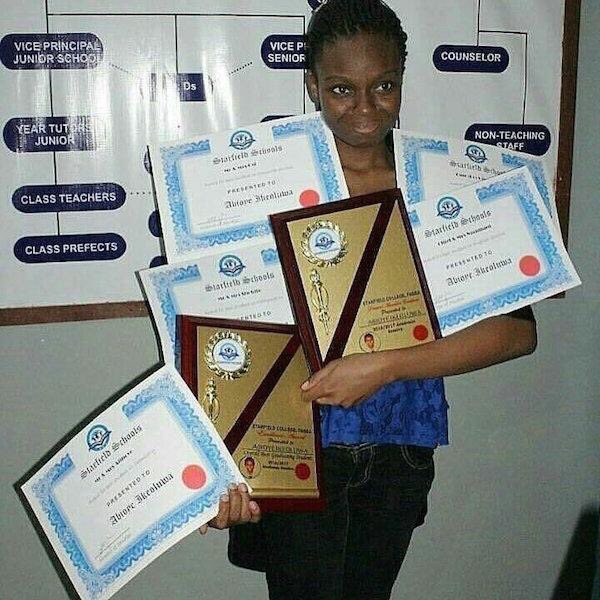
Ikeoluwa, now based in the U.S. as a software engineer, has developed Alarino, a digital platform that helps people write and translate Yoruba correctly, especially by including the tone marks that give the language its true meaning.
By Eberechi Obinagwam
In 2017, a remarkable achievement was recorded in Iju, Lagos State, where 15-year-old Ikeoluwa Abioye from a less-fancied school, Starfield Schools, secured nine A1s (Distinctions) in her West African Senior School Certificate Examination (WASSCE). Her exceptional grades spanned a wide range of subjects, including Mathematics, English, Further Maths, Chemistry, Physics, Civic Education, Catering, Biology, and ICT.

Eight years later, Ikeoluwa, now based in the U.S. as a software engineer, has developed Alarino, a digital platform that helps people write and translate Yoruba correctly, especially by including the tone marks that give the language its true meaning.
How it started
After the WAEC feat and the publicity that came with it, a world of opportunities opened for Ikeoluwa. “After it was published, I received calls from education consulting agencies interested in helping me study abroad. While I didn’t go with any of them, the experience sparked the idea that studying in the U.S. was possible—and it gave me the confidence to pursue it. Financial concerns were a real issue, but I eventually secured a full financial aid package to attend Dartmouth College”, she enthused.
READ ALSO:
TheNiche Young Entrepreneur: Ifeoma Nnoke’s bold step from Microbiology to Cake making
At Dartmouth, Ikeoluwa studied Computer Engineering, which was a dream come true because of her love for learning hardware, software, and machine learning. That essentially equipped her with the skills to build and tinker with ideas that matter.

The interest in Yoruba?
While studying in the U.S., Ikeoluwa was experiencing challenges using Google to confirm the meaning of words in Yoruba. The search engine doesn’t have the diacritics, a sign which, when written above or below a letter, indicates a difference in pronunciation. “I often needed to recall Yoruba words or confirm meanings. I turned to Google Translate and similar tools, but most of them lacked proper tone marks. In Yoruba, diacritics aren’t optional; they determine meaning. Without them, the same letters could mean completely different things”, she recalled.
Ikeoluwa deployed her tech skills to fix the problem. That’s where Alarino comes in. She developed the platform to curate and build a dataset of properly diacritized Yoruba words.

Inspiration
At Dartmouth, Ikeoluwa realised that African languages were underserved by tech, and this gap overlooked their linguistic and cultural needs. In her words; “Our needs are unique, and our languages are frequently left out of global tech innovations.”
Ikeoluwa is now on a mission to build a platform that reflects minority languages which big techs have often overlooked in the tech space.
She said: “At Dartmouth, I served as president of the African Students Association. We created a support network for African students and helped others adjust to life in the U.S. That experience opened my eyes to a broader issue: there’s a large, often overlooked audience in Africa and the diaspora whose linguistic and cultural needs are underserved by tech. That awareness drives my work. And I want to build tools that speak directly to that gap.”
Even though Alarino started as a personal solution tool for Ikeoluwa, it has grown into a broader mission which Africans can use to ensure it reflects their needs and usage. She said: “I want Alarino to become the world’s largest and most reliable Yoruba translation platform. That means expanding our data through both machine learning techniques and human contributions while always maintaining quality.”
She added: “Beyond a dictionary, I envision Alarino powering future Yoruba-focused applications – voice assistants, educational tools, mobile keyboards, and even real-time AI translators.”
Eye on quality

Ikeoluwa said not only does she want Alarino to be the go-to resource for learning and understanding the Yoruba language, but also building trust so that users feel confident that the translations and spellings are accurate. “By demonstrating what’s possible with thoughtful, culturally informed tools, I hope to inspire more work in this field and more visibility for African languages”, she said.
Going commercial?
Ikeoluwa says Alarino is, for now, a public service tool, her contribution in helping to preserve underserved languages in the tech space; hence, she is not considering placing a fee for its use.
About Ikeoluwa

Ikeoluwa, a software engineer, currently resident in the U.S. made headlines in 2017 when she recorded nine A1s in the 2017 May/June West African Senior School Certificate Examination (WASSCE). She later scored 305 in the Unified Tertiary Matriculation Examination (UTME) conducted by the Joint Admissions and Matriculation Board (JAMB) the subsequent year.
An indigene of Irepodun Local Council of Osun State, Ikeoluwa had in 2017 said she would love to go to Massachusetts Institute of Technology (MIT) or Harvard University to study Computer Engineering, a feat she has now achieved at Dartmouth.






